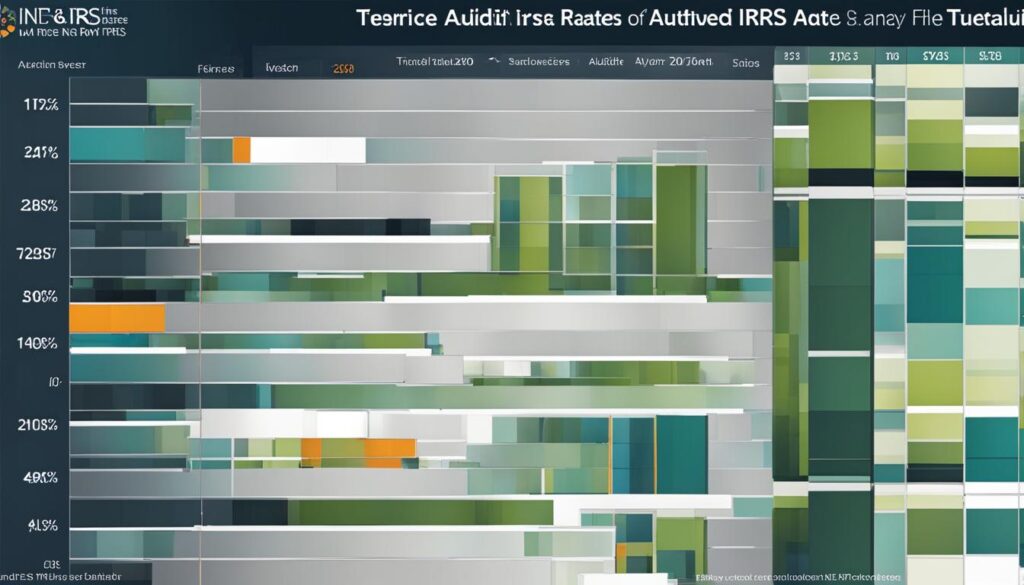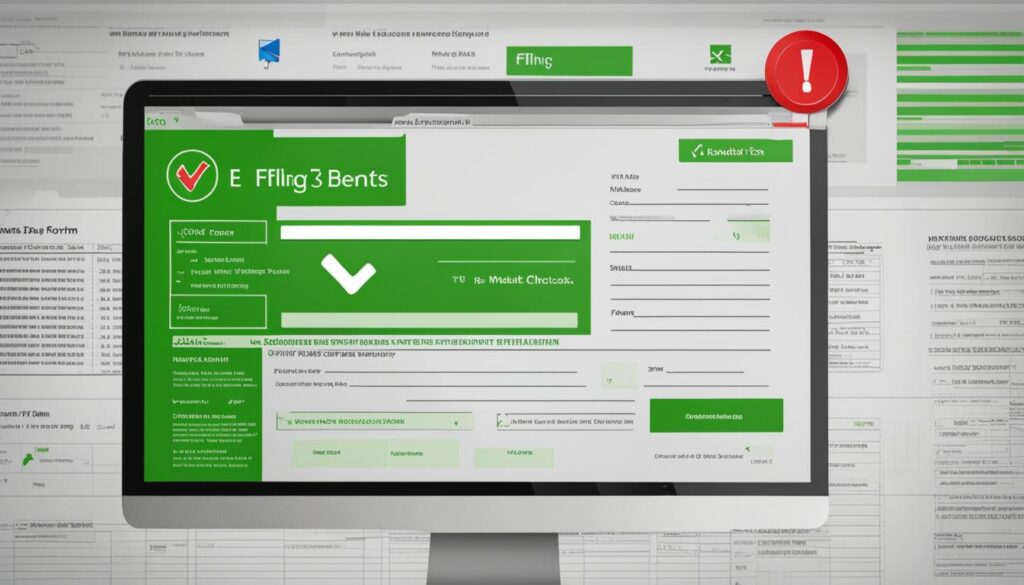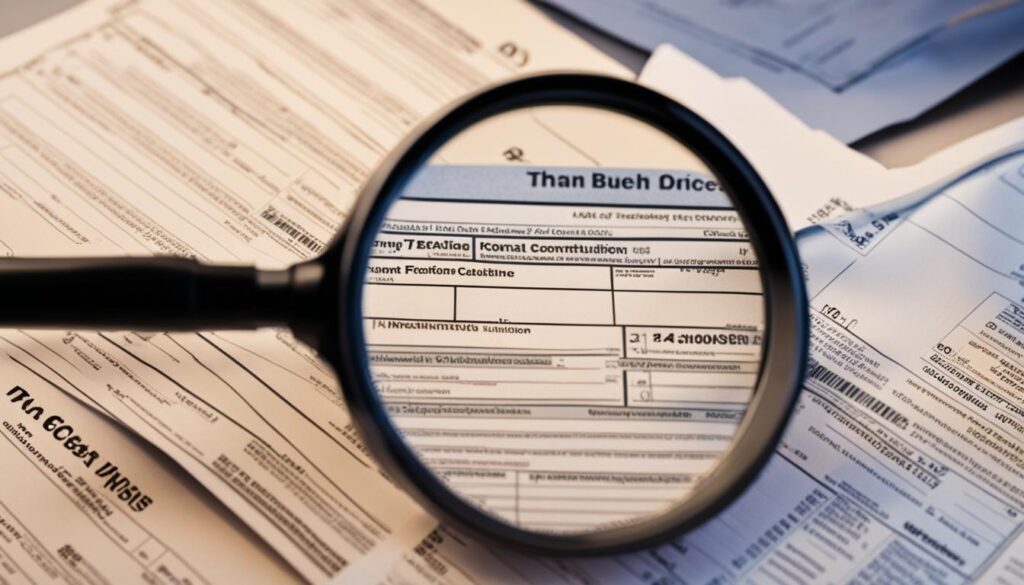As tax season approaches, the thought of an audit by the Internal Revenue Service (IRS) can often induce stress and worry among taxpayers. While the prospect of being audited might feel like a looming threat, you can employ several effective strategies to avoid IRS audit complications. The key to minimizing chances of an IRS audit lies in meticulous preparation and adhering to the IRS’s guidelines – a feat that is more achievable than you might think.
Your vigilance in preparing your tax documents plays a vital role in tips for avoiding IRS audit scrutiny. Though the IRS’s selection process can seem unpredictable, there are concrete steps you can take to safeguard your return against red flags. Let’s explore how you can protect your finances and remain compliant with these essential strategies to avoid IRS audit worries.
Key Takeaways
- Understanding the audit process and adhering to IRS guidelines are critical in minimizing audit risk.
- Ensuring accuracy in your tax returns is one of the foremost strategies to prevent IRS audit selection.
- Being thorough with income reporting and realistic with your deductions are key steps to avoid IRS audit.
- E-filing can significantly reduce errors and is thus recommended for minimizing chances of an IRS audit.
- Maintaining meticulous records and receipts plays a pivotal role in your audit defense strategy.
The Importance of Accurate Figures in Tax Returns
When aiming to avoid IRS audit, your attention to detail can make all the difference. Let’s look at how meticulous proofreading and reporting can serve as critical steps to avoid an IRS audit, thus reducing the risk of IRS audit complications.
Ensuring your tax figures reflect the utmost accuracy is more than just good practice. It’s a non-negotiable aspect of tax compliance that directly impacts your odds of staying off the IRS’s radar. Below are strategic approaches that exemplify how to avoid IRS audit issues by keeping your numbers in check.
Double-Checking for Data Entry Errors
Before hitting submit or mailing your tax return, take the time to meticulously review every entry. Errors in data entry may appear to be minor oversights, but they can trigger an audit. From transposed numbers to accidental omissions, these mistakes are easily flagged by the IRS’s automated systems. To mitigate this, going over your return with a careful eye is one of the fundamental steps to avoid IRS audit.
Aligning Income Reports and Tax Forms
Another element in reducing the risk of IRS audit is the alignment of all reported income with the corresponding tax documents. Gather your income reports, bank statements, and relevant financial documents, and compare them side by side with the figures on your tax return. Make sure that your reports of dependents and exemptions match across forms to maintain consistency. This alignment is crucial for avoiding IRS audit queries that may arise from mismatched information.
- Always have all pertinent financial paperwork ready before filing.
- Confirm that the income, dependents, and exemptions reported are accurate and up-to-date.
- Utilize e-filing as it typically ensures that calculations are automatically checked for accuracy.
By incorporating these vigilant practices into your tax preparation routine, you can effectively minimize the chances of discrepancies that often lead to further IRS scrutiny. Keep in mind that reducing the risk of IRS audit not only involves knowing what to do but also understanding how each step creates a stronger, more coherent tax return.
Honesty: Key to Avoid IRS Audit
Upholding honesty in your tax return is more than just a moral standpoint. It’s a cornerstone in avoiding an IRS audit. An open and transparent approach in disclosing all your financial information is the safest path to accurate reporting. The following tips illustrate how to harness honesty to prevent IRS audits and maintain the integrity of your tax filings.
When you’re judicious in documenting every source of income and ensuring each deduction claimed is justifiable, you lay the groundwork for a defensible tax return. Below, we outline actionable steps to encapsulate the principle of honesty in your tax processes:
- Gather and organize your receipts, especially if you are self-employed, to substantiate every business expense.
- Ensure income from all channels – employment, investments, freelance work – is accurately reported and matches the official documentation.
- For deductions, credits, and exemptions, have clear evidence or records that validate their legitimacy.
Deeply ingrained truthfulness in every aspect of your tax return, from reporting income to claiming deductions, acts as your first line of defense against triggering an audit. Not only does this reflect good financial stewardship, but it also signals reliability to the IRS – which can be influential in avoiding an IRS audit.
Keep in mind that while addressing your tax obligations can be complex, and sometimes taxing, the bedrock of avoiding unwanted attention from tax authorities is a transparent disclosure of every financial figure.
Remember, inaccuracies and misleading information, whether intentional or inadvertent, can lead to severe penalties, not to mention considerable stress and inconvenience. Thus, steering through the tax season with sincerity and meticulousness is not only advisable – it is essential.
As part of your preparation, consider the words of Benjamin Franklin, “Honesty is the best policy.” Let this be your guiding principle as you tackle your tax returns, ensuring no stone is left unturned in providing a true account of your financial year.
By embracing honesty and accurate reporting in your financial affairs, you not only stand to avoid IRS audits but also shape a reputation of integrity in all your tax-related endeavors. This ethos extends beyond the immediate tax season and benefits your year-round financial management.
Understanding the IRS Audit Statistics

Insight into IRS audit statistics and understanding audit rates by income level are crucial for taxpayers seeking to navigate the complexities of the tax season. A keen awareness of these figures can be instrumental in planning and executing the top ways to avoid IRS audit pitfalls. Delving into who is audited and why, as well as discerning patterns and trends in the audit selection process, will empower you to fortify your tax filings against unnecessary scrutiny.
Who Gets Audited and Why?
Becoming familiar with the relationship between income levels and IRS audit rates is essential in appreciating how fiscal audits are targeted. While taxpayers across various spectrums could face an audit, certain groups tend to attract more attention than others. Examining these groups uncovers insights into strategic tax filing practices that may reduce the possibility of an audit.
Breaking Down Audit Rates by Income Level
It’s notable that the majority of taxpayers earning under $200,000 experience less frequent IRS audits. Conversely, individuals earning above $1 million are more susceptible to audits, with the increased likelihood being attributed to the complexities inherent in their tax returns and the potential for inaccuracy or fraud. Specifically, those who file Schedule C, highlighting business profits and losses, as well as taxpayers claiming extensive deductions like charitable contributions, are scrutinized with greater vigor.
- Under $200,000: Lower risk of audit, due to less complex returns and fewer discrepancies.
- Above $1 million: Elevated audit risk, with heightened review of deductions and reported income.
- Schedule C Filers: Increased likelihood of audit due to the potential for reporting errors.
Informed taxpayers equipped with an understanding of these audit trends can be more vigilant with their filings, ensuring accuracy and compliance. Aligning with these findings, maintaining meticulous records and exercising diligence in deductions can substantially minimize audit risks.
Income Reporting: Complete and Truthful Disclosure

As you approach the task of filing your taxes, remember that complete income reporting and truthful disclosure are not only best practices but also your safeguards against the likelihood of an IRS audit. The IRS’s ability to cross-reference your reported earnings with the information they receive from financial institutions makes accurate and comprehensive reporting essential.
Your dexterous management of income documents plays a crucial role in the fine art of income reporting. This attention to detail encompasses all taxpayers, whether you receive a steady paycheck, dividends from investments, or revenue from rental properties. All of these require a steadfast commitment to truthful documentation. Let’s delve into the imperative of proper income reporting and its influence on reducing audit risk.
- Review all 1099 forms for accuracy: Financial institutions issue these forms for diverse income streams, such as capital gains, dividends, and interests. It’s your responsibility to ensure that each form is accounted for on your tax return.
- Report income not automatically documented: Many types of income won’t come with a 1099, such as certain types of business or rental income. Be diligent in keeping track of these earnings and report them correctly.
- Address discrepancies from outdated forms: Should you encounter missing or outdated 1099s, proactively seek out the correct information to avert errors that could lead to IRS scrutiny.
To bolster your position in the eyes of the IRS, being thorough in your income reporting is paramount. Adopt the practices of double-checking your documentation against your tax return, ensuring you’ve captured every bit of income that should be reported. Take heed of expert advice on avoiding IRS audit, which often emphasizes the significance of accurate, truthful, and complete reporting.
Embrace truthful disclosure as you navigate the intricacies of tax season. With the right approach, the documentation of your financial records becomes a reflection of integrity and compliance, paving your way to tranquil tax filings, devoid of the stress associated with audit risks.
Deduction Realism: Claiming Legitimate Tax Deductions

As you navigate the complexities of tax season, understanding the difference between permissible tax deductions and those that could set off IRS audit triggers is paramount. Being well-versed in legitimate tax deductions can provide significant tax savings while avoiding scrutiny from the IRS. Here, you’ll receive essential tax deductions guidance to ensure your claims are within the bounds of the law and not likely to raise concerns with the IRS.
Knowing What Constitutes a Legitimate Deduction
The IRS allows a variety of deductions that can reduce your taxable income, but not all expenses are deductible. Common legitimate tax deductions include mortgage interest, charitable contributions within defined limits, and educational expenses. It’s critical to know that personal expenditures, such as daily commuting costs to your regular job, are not considered deductible expenses. To optimize your tax return without elevating risk, focus on understanding what qualifies as a legitimate deduction.
Cautions for Schedule C Filers
If you are self-employed or operate as a sole proprietor, filing a Schedule C to report business profits and losses can attract additional attention from the IRS. Closely monitor Schedule C concerns, as deductions that are substantial relative to income or consistent year-over-year losses might suggest to the IRS that your business activities are not genuinely profit-oriented. Aim to substantiate every deduction with clear, organized records and ensure alignment with IRS guidelines for business expenses.
Remember, while deductions can minimize your tax liability, claiming more than what you’re entitled to can significantly increase your chances of an audit.
- Only claim deductions that are supported by detailed documentation and receipts.
- Avoid overstating business use, such as home office space, if it’s not exclusive to your business.
- Be conservative with auto-related deductions, and maintain logs of business mileage as proof.
To ensure you’re making the most of your tax deductions while also minimizing the risk of an audit, consider consulting with a tax professional. They offer tailored tax deductions guidance, assist with Schedule C concerns, and can help you navigate the thin line between maximizing legitimate tax deductions and avoiding IRS audit triggers.
Documenting Deductions: The Pathway to Audit-Proofing

As you gather your paperwork to file your taxes, it’s crucial to focus on documenting deductions accurately, one of the key steps to avoid IRS audit scrutiny. Reliable documentation acts as a vital component in your audit-proofing strategies, offering clear evidence supporting your deductions. Let’s examine the documentation practices that can fortify your tax filings.
Thorough record-keeping is not simply an organizational task but a defensive tool against the possibility of an audit. The adage ‘better safe than sorry’ takes on real meaning when it comes to the potential for an IRS review. Here are actionable guidelines for maintaining your deduction records:
- Collect and organize all receipts that correlate to your claimed deductions, ensuring you have physical or digital proof of each item.
- Categorize deductions and maintain a filing system that allows for quick retrieval if the IRS requests additional information.
- Keep detailed logs and appointment books which can show the context for certain deductions, such as business travel or entertainment expenses.
- If you’re claiming deductions for home office use or vehicle expenses, maintain proof that substantiates the percentage of business use.
If your claim includes deductions for rental losses or other areas where the IRS has enacted specific rules, further documentation is imperative. For instance, if you have rental property, you may need to provide:
| Type of Expense | Documentation Required | Tips for Record-Keeping |
|---|---|---|
| Rental Repairs & Maintenance | Receipts, Contracts, Invoices | Take before and after photos of any repairs and improvements |
| Rental Income Received | Rental Agreements, Bank Statements | Use dedicated bank accounts for rental transactions |
| Property Depreciation | Purchase Documents, Improvement Invoices | Consult with a tax professional to accurately calculate depreciation |
| Mortgage Interest | Form 1098, Loan Statements | Store forms digitally for easier access and archiving |
Recognize that comprehensive documentation creates a narrative for your financial activities. It tells the story of your business decisions and personal financial management, providing the IRS with exact and validated information.
Invest the time now in documenting deductions correctly to potentially save countless hours and resources in the future should an audit take place.
Ultimately, the key to avoiding an IRS audit isn’t just about having the records but organizing and maintaining them in a way that can quickly and clearly justify your deductions. Whether you face a simple inquiry or a more complex examination, your preparation will demonstrate your dedication to tax compliance and serve as the foundation of your audit-proofing strategies.
Utilizing E-Filing: Reducing Errors and Avoiding an IRS Audit

Electronic tax filing, commonly known as e-filing, is rapidly becoming the preferred method for submitting tax returns. E-filing benefits are numerous, not least of which is the significant reduction in errors compared to paper tax returns. Adopting IRS e-file systems is a proactive step as it helps minimize audit risk, ensuring your financial reporting is as accurate and reliable as possible.
The Advantages of Electronic Tax Filing
E-filing revolutionizes the tax filing process by providing a streamlined and efficient system, synonymous with reducing the chances of mistakes. Through electronic tax filing, you can submit your tax details directly to the IRS with ease, with calculations being checked automatically, saving time and reducing the headache of manual computation. This process doesn’t just provide the benefit of convenience. It also helps to ensure that your tax reporting is precise and less likely to draw attention for the wrong reasons.
Understanding E-filing Error Rates
When looking at the data on tax return accuracy, it is clear that e-filing has a considerable edge over traditional paper filing. While paper returns have a significant error rate of 21%, electronically filed tax returns boast an impressively low error rate of just 0.5%. This stark difference is a clear indicator of the e-filing benefits and how they contribute to a smoother, more reliable tax filing experience. By choosing IRS e-file options, you’re not just embracing technology – you’re actively working to minimize audit risk.
| Error Type | Paper Filing Error Rate | E-filing Error Rate |
|---|---|---|
| Mathematical | 20% | 1% |
| Data Entry | 15% | Less than 1% |
| Incorrect Bank Details | 2% | Practically Null |
By making the move to electronic filing, you’re placing confidence in a system designed to avoid common pitfalls found in traditional paper filing methods. With the advanced checks and accuracy that e-filing systems provide, you’re effectively placing a safeguard between you and potential audit-related issues. It’s a smart fiscal strategy to employ IRS e-file to ensure the integrity and precision of your tax returns.
The Lowdown on Large Income Fluctuations

Understanding the impact of significant income fluctuations on your tax returns is crucial for avoiding unwelcome IRS attention triggers. Experienced by many, especially those who are self-employed or run their own business, these fluctuations can signal to the IRS that there might be more to your financial story. Income disparities from year to year can often ring alarm bells, suggesting the possibility of underreported income. Hence, maintaining uniform income reporting becomes an indispensable strategy for taxpayers.
While fluctuations in income are not unusual, they do require careful explanation. The IRS monitors these shifts and determines whether they align with common patterns or if they warrant a closer look. It is advisable to include explanatory notes with your return, detailing the reasons for these variations, whether they stem from business growth, a significant project, or an extraordinary event causing a temporary spike or drop in earnings. Transparent communication can preempt any questions that might lead to an audit.
If you experience major income changes, preemptively clarify with well-documented explanations to ensure your tax filings resonate with your actual financial developments.
Now, let’s scrutinize what to highlight in case of income shifts:
- Documentation: Keep comprehensive records of all income sources and financial transactions throughout the year to provide a clear context for any changes.
- Consistency: While reporting your income, use consistent methods and categorizations to minimize potential confusion or suspicion.
- Diligence: Report all income promptly and accurately to avoid complications or misunderstandings with the IRS.
In the event of considerable income fluctuations, here’s what your tax filing should reflect:
| Year | Reported Income | Explanation for Variation |
|---|---|---|
| Previous Year | $X | Provide details of any unusual events, financial windfalls, or losses that explain the income variation. |
| Current Year | $Y |
Proactive steps like this not only simplify your tax process but are also integral in maintaining uniform income reporting. Addressing large income discrepancies forthrightly with well-prepared documentation reaffirms the trustworthiness of your tax returns, thereby reducing the likelihood of an IRS audit.
Strive to present a clear narrative of your earnings to avoid doubts that can trigger an IRS review.
Keep vigilant, stay forthright in your reporting, and navigate the tax season with confidence. Drawing IRS attention need not be a concern if you’re equipped with organized, detailed, and transparent financial records.
Maintaining Rigorous Financial Documentation

The bedrock of solid IRS audit defense strategies lies in consistent, rigorous bookkeeping practices. By maintaining detailed financial documentation, you fortify your preparation for an audit, underlining the integrity of every financial transaction you report. This approach not only sets a strong foundation for presenting your case to the IRS but also instills confidence in the accuracy of your filings.
Setting the Record Straight with the IRS
When it comes to financial documentation, you’re not only tracking current transactions but safeguarding your past operations as well. The IRS suggests maintaining records for a minimum of seven years to cover the period that could be scrutinized in the event of an audit. This disciplined tracking is key in forming a reliable IRS audit defense.
Efficient Bookkeeping and its Benefits
Efficient bookkeeping goes beyond a mere IRS requirement. It serves several benefits that help manage your finances with precision. Accurate records can aid in identifying tax-deductible expenses, optimising cash flow, and providing a clear picture of your financial health, which is invaluable for making informed business decisions.
| Financial Element | Recommended Documentation | Record-Keeping Duration |
|---|---|---|
| Income Statements | Receipts, Deposit Information, Invoices | At least 7 years |
| Business Expenses | Receipts, Bills, Cancelled Checks | At least 7 years |
| Deductions and Credits | Proof of Eligibility, Calculation Worksheets | At least 7 years |
| Property Records | Purchase and Sales Agreements, Deeds | For the duration of ownership plus 7 years |
| Employment Taxes | W-2s, Payroll Reports, Tax Deposits | At least 7 years |
By investing the time now to maintain rigorous bookkeeping habits, you’ll not only ready yourself for any IRS audits that may arise but also ensure ongoing financial clarity. Meticulously kept financial documentation solidifies your compliance and equips you to tackle any audit-related challenges with confidence.
In-depth Review of Unusual Deductions and Credits

When filing your taxes, one area that often invites additional scrutiny from the IRS involves claiming unusual deductions and credits. It’s crucial to navigate this complex aspect of tax filing with a firm understanding of what’s permissible and how to substantiate your claims. This section delves into the nuances of specific deductions like charitable contributions and real estate that tend to attract heightened IRS scrutiny.
Charitable Contributions and Their Impact on IRS Scrutiny
Generosity may not only help those in need but can also provide you with tax benefits. However, when it comes to charitable contributions, there’s a fine line between a commendable write-off and a red flag for an audit. The IRS pays close attention to claims that might seem overly generous compared to your income. A deduction cap is set at 60% of your adjusted gross income for cash donations, a precautionary measure to balance philanthropy and tax obligations.
It’s not enough to simply state your charitable giving on your tax forms. You must have appropriate documentation, such as written acknowledgements or receipts from the recipient organizations, particularly for any single donation over $250. Without this proof, you may face passive losses scrutiny, leading to complicated audit procedures.
Real Estate and Passive Activity Loss Attention
Real estate investors should be especially wary of the IRS’s focus on passive activity losses. Passive income, often derived from rental properties, requires meticulous documentation, especially if you’re reporting losses. The IRS uses this real estate tax attention to ensure that claimed losses align with true financial investment and engagement in the property.
For those who qualify as real estate professionals, loss deductions may be more lenient, but you need to meet specific criteria, such as devoting at least 750 hours annually to real estate activities and managing your properties directly. If you’re not active in the day-to-day operations or property management, expect limitations on the losses you can claim.
Here’s an outline of the documentation required:
| Type of Deduction | Documentation Required |
|---|---|
| Charitable Donations | Receipts, Bank Records, Written Acknowledgments |
| Real Estate Losses | Rental Agreements, Expense Receipts, Time Logs |
| Real Estate Professional Hours | Calendar Entries, Logbooks, Contracts |
Being proactive in documenting these transactions demonstrates your commitment to compliance and can be a decisive factor in moving swiftly past an IRS examination. Underlining your claims with verifiable proof is your most effective defense.
In summary, whether it’s charitable contributions or complex real estate ventures, understanding and abiding by the IRS’s rules regarding unusual deductions and credits, complete with detailed documentation, is essential for a stress-free tax season.
Protecting Your Estate Tax Filings from Audits
Navigating the complexities of estate tax filing can be a daunting task. With higher scrutiny from the IRS, including estate audits, it’s essential to employ strategies that protect your filings from audit risk. A considerable element of this protection is ensuring asset valuation accuracy – an area where IRS estate audits commonly focus their attention.
Asset Valuation Strategies
One of the primary concerns during estate tax filing is the proper valuation of the estate’s assets. Undervalued assets are a red flag that can trigger IRS estate audits. To mitigate this risk, implement a strategic plan for asset valuation that reflects current market conditions and adheres to IRS guidelines.
- Review recent sales of comparable assets to establish a fair market value.
- Document the rationale behind each valuation with market trends, expert opinions, and relevant transactions.
- Update asset values periodically to account for fluctuations in the market.
Following a systematic approach to asset valuation with well-documented evidence is vital in safeguarding against audits. Estate representatives ought to ensure every value claimed adheres to IRS standards, painting an accurate picture of the estate’s worth.
The Role of Qualified Appraisers
Qualified appraisers bring a level of credibility and professionalism to estate tax filings that is often indispensable. These experts are instrumental in providing defensible and accurate asset valuations – a crucial deterrent against IRS estate audits. When selecting appraisers, consider their certification, experience, and familiarity with IRS appraisal requirements.
- Engage multiple qualified appraisers for large or unique assets without readily available market prices.
- Obtain detailed appraisal reports that include methodology, comparable sales, and condition assessments.
- Average the estimates from different appraisers to present a balanced valuation to the IRS.
Leveraging the expertise of qualified appraisers ensures that you establish credible valuations for all assets within an estate. It is a compelling defensive measure that not only addresses IRS concerns but fortifies the integrity of your entire estate tax filing.
Proper appraisal is not only a compliance measure but a strategic advantage in estate tax filing. A dependable valuation speaks volumes about the estate’s adherence to IRS regulations and its preparedness for possible audits.
Evaluating Audit Risks for Unconventional Taxpayer Situations
For unconventional taxpayers who find themselves outside the contours of standard tax scenarios, understanding and navigating IRS audit risks is of paramount importance. Whether you’re dealing with high-value assets lacking public pricing or operate a closely held business, the complex nature of these situations often triggers a closer look from the IRS. Possessing an awareness of potential red flags and engaging in proactive audit risk evaluation can significantly dilute the likelihood of an audit.
To mitigate IRS scrutiny, it is crucial to ensure that your transactions, deductions, and overall return presentation adhere to the existing tax codes. Here are some areas where detail-oriented care can support your compliance efforts:
- Ensure accuracy and thorough documentation for all transactions, especially those of high value or involving intricate tax rules.
- Consult with tax professionals who are well-versed in handling high-complexity tax returns.
- Maintain clear communication and proper record-keeping to substantiate your financial activities.
Although these steps require effort and may involve additional costs for professional counsel, they can offer invaluable protection against the disruptions and challenges an IRS audit could present. So, keep these practices in mind as you prepare your tax filings, regardless of the complexity your unique situation may entail.
It’s worth noting that while unconventional taxpayers may face increased audit risks, the right strategies and attentiveness to detail can provide a robust shield. A balanced evaluation of your tax position, including the potential audit triggers implicit in your unique financial circumstances, will guide you in aligning with IRS expectations and reducing the chance of issues arising post-filing.
Being detail-focused and compliant with tax laws fortifies you against the possibility of an audit, even in the most complex of tax situations.
While no strategy can guarantee immunity from audits, proper preparation enables you to confront an IRS inquiry with confidence. Keep your records well-organized, engage with knowledgeable experts early in the tax preparation process, and stay abreast of changes in tax legislation that may impact your filing. By taking these meticulous steps, you are positioning yourself to navigate the tax landscape successfully, even when it deviates from the norm.
Frequently Asked Questions
What are the key strategies to avoid IRS audit?
Key strategies include ensuring accuracy of tax figures, being honest and truthful in reporting all sources of income, deductions, and credits, making use of e-filing to reduce errors, maintaining detailed and rigorously kept financial documentation, and understanding and complying with the IRS’s rules concerning deductions and credits.
How can accurate figures reduce the risk of an IRS audit?
Accurate figures help avoid data entry errors and discrepancies between income reports and tax forms – common red flags for IRS audits. Precision in reporting and double-checking your returns can greatly minimize the chances of an oversight that might trigger further scrutiny.
Why is honesty important in my tax return to avoid an IRS audit?
Being truthful and realistic in reporting your income, deductions, and credits demonstrates transparency and compliance with tax laws. This reduces the likelihood of discrepancies that could lead to an audit, as the IRS often looks for signs of misreporting or fraud.
Who is more likely to get audited by the IRS?
IRS audit statistics show that higher-income earners, typically those making over $1 million, and taxpayers reporting very low income or substantial losses, such as Schedule C filers, are more likely to be audited. Also, individuals with large, unexplained fluctuations in income could face higher scrutiny.
What constitutes a legitimate tax deduction?
Legitimate tax deductions are those that comply with IRS rules. They include various expenses that are both necessary and ordinary for your business or profession. Personal expenses, like daily commuting, are not deductible. When in doubt, consult current IRS guidelines or a tax professional to ensure compliance.
How important is documenting deductions when filing taxes?
Documentation is essential for all claimed deductions. If you are audited, having detailed records such as receipts, logs, and written explanations to back up deductions can prove invaluable. It is one of the most effective ways to audit-proof your tax filings.
Why is e-filing a recommended method to avoid an IRS audit?
E-filing is recommended because it significantly reduces the chance of errors, which are more common in paper returns. The IRS’s e-file system has a lower error rate and can quickly identify and correct common mistakes before they lead to an audit.
What should I do about large income fluctuations to avoid an IRS audit?
If you experience large income fluctuations, maintain clear and accurate records explaining the changes. Documentation can help minimize suspicion and clarify any questions the IRS might have, thereby reducing the risk of an audit.
How does rigorous bookkeeping benefit me in the context of an IRS audit?
Rigorous bookkeeping ensures that all financial transactions are accurately recorded. This can help substantiate claims made on your tax return, demonstrate the legitimacy of your business operations, and satisfy IRS inquiries during an audit.
Can charitable contributions trigger an IRS audit?
Yes, particularly large or disproportionate charitable contributions can raise flags for the IRS. Abide by the deduction caps, such as the 60% limit of your adjusted gross income for cash donations, and always have thorough documentation for any charitable deductions claimed.
How do I protect my estate tax filings from audits?
To protect your estate tax filings, ensure that assets are valued accurately and realistically. Using multiple qualified appraisers and providing the IRS with well-supported valuations can decrease the risk of an audit related to your estate tax filings.
What additional risks do unconventional taxpayers face regarding IRS audits?
Unconventional taxpayers, such as those with closely-held businesses or sizable assets without a public market price, may face increased scrutiny. Ensuring strict adherence to tax laws and working with tax professionals to verify the accuracy of such complex returns can help mitigate audit risks.
What overall steps can I take to ensure peace of mind during tax season?
To ensure peace of mind, always report income and deductions accurately, use e-filing to lower error rates, keep detailed records, and be prepared to provide a thorough accounting of your tax claims if necessary. If your tax situation is complex, consider seeking expert advice to ensure that you are following all applicable rules and regulations.
The Bottom Line
As tax season unfolds, the importance of minimizing chances of an IRS audit cannot be overstated. Ensuring peace of mind during this pivotal time involves embracing a series of calculated practices that fortify the integrity of your financial profile. Drawing upon expert advice on avoiding IRS audits, taxpayers can equip themselves with robust strategies that emphasize accuracy, honesty, and diligent record-keeping.
From the outset, dedicating time to meticulously checking figures can significantly curb the potential for discrepancies that may otherwise catch the IRS’s attention. Coupled with the precision and reduced errors afforded by e-filing, these methods represent the proactive steps heralded by tax professionals worldwide. Moreover, the conscientious effort of consistently documenting deductions creates a solid line of defense, ready to substantiate your financial narrative should the IRS inquire further.
While full-scale audits are infrequent, remaining vigilant and prepared is the hallmark of a taxpayer committed to upholding the highest standards of compliance. These behavioral cornerstones not only aim at minimizing chances of an IRS audit but also foster broader fiscal responsibility. In adopting these strategies, you can navigate tax season with a greater sense of security, knowing that your tax returns are an accurate reflection of your financial diligence and integrity.






